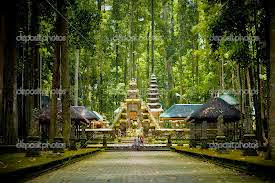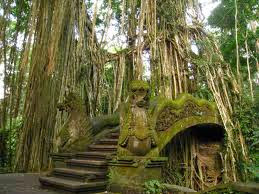Monkey forest ubud
Senin, 17 November 2014
The Ubud Monkey Forest is a nature reserve and temple complex in Ubud, Bali. Its full name as written on a welcome sign is the Padangtegal Mandala Wisata Wanara Wana Sacred Monkey Forest Sanctuary. The complex houses approximately 605 Crab-eating Macaque ( Macaca fascicularis) monkeys (39 adult males, 38 male sub adult, 194 adult females, 243 juvenile and 91 infants —2011—). [1] There are four groups of monkeys each occupying different territories in the park. The Sacred Monkey Forest is a popular tourist attraction in Ubud, and is often visited by over 10,000 tourists a month. [2] The forest comprises approximately a tenth of a square kilometer (approximately 10ha or 27 acres) [3] and contains at least 115 different species of trees. [4] The Monkey Forest contains the Pura Dalem Agung Padangtegal temple as well as a "Holy Spring" bathing temple and another temple used for cremation ceremonies. [5] The Monkey Forest is owned by the village of Padangtegal , and village members serve on the Monkey Forest's governing council. The Padangtegal Wenara Wana Foundation manages the Monkey Forest and serves to maintain its sacred integrity and to promote the sacred site as a destination for visitors. The forest has been populated by monkeys in greater numbers than an environment undisturbed by humans would allow for a number of years, with the population density now (2013) higher than ever. The visitor will notice the interesting phenomenon of numerous obese monkeys, a testament to the almost unbounded food supply the huge number of tourists entering in and near the forest provide. Tourists are bitten by monkeys daily and numerous of these attacks can be can be found by a key word searches on YouTube. The monkeys - crab eating macaques - will invariably approach human visitors in a large group and then grab any bags containing food. They may also grab bags not containing food. If the demanded food is readily provided the monkeys will usually not, although occasionally will, bite the human owner. If the demanded food is not provided quickly enough, one or more of the monkeys will certainly bite the human owner. Numerous bites occur because humans are not quick enough in producing a desired food item. Given that tourists don't enter and travel the monkey forest armed and ready to fight relatively small monkeys, and that dogs are not allowed inside, the monkeys have none of the normal environmental competitors to keep them in check. They have also lost the fear of humans normal to almost all animals. Monkey bites are a very serious medical event given the variety of viruses monkeys carry that can be transferred to humans. For example, Herpes B virus is very prevalent in crab eating macaques, should be assumed to be very prevalent in the populations in Ubud Monkey Forest, and frequently causes death in humans. Given their apparently increasing aggressiveness, and the risk they pose to human health, there have been calls by Balinese politicians for a cull of macaques in Bali. These calls have not been formally accepted by authorities
Langganan:
Posting Komentar (Atom)

















Tidak ada komentar:
Posting Komentar